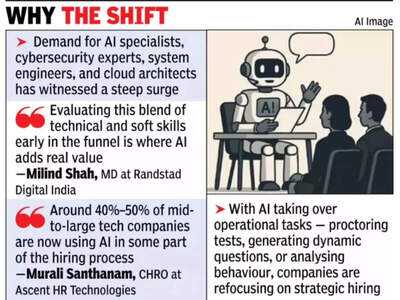Imagine walking into your first job interview and the person across the table isn’t human. Instead, it’s a smart AI bot, quietly sizing you up before any recruiter even sees your face.
This might sound like sci-fi, but it’s becoming reality as companies like Fractal Analytics, UST, and Happiest Minds hand over the early rounds of hiring to artificial intelligence, TOI has reported.
The tech world is bursting at the seams with applicants, and companies are struggling to find the right fit. “Nearly 50% of mid-to-large tech companies are now using AI in some part of the hiring process – mainly in screening and assessments – though many are still in early or pilot stages,” TOI quoted Murali Santhanam, CHRO at Ascent HR Technologies, as saying.
What started as simple resume scanning has now morphed into AI conducting full-on interviews. “Five years ago, AI was just scanning resumes. Today, it's effectively acting as an interviewer,” said Savita Hortikar, HR head at FractalAI. Their AI, Ikigai, designs fresh, role-specific tests for every candidate on the spot, cracking down on cheating and boosting hiring quality. “Every candidate now gets a fresh test. It has significantly improved the quality of hiring,” Hortikar told TOI.

The perks? Flexibility. Candidates get flexible interview timings, including late nights when human panels are scarce. “Most candidates prefer late-night interviews. Finding a tech panel at that hour is hard,” admits Rajesh Chandran Sogasu, head of talent acquisition at Happiest Minds. Their AI steps in, posing tricky scenario questions and scoring responses, leaving humans to review the top picks later.
At UST, the AI does double duty, not just testing candidates but keeping a sharp eye on exam integrity. “It tells us if the answers are original or AI-generated. We've built mechanisms to detect tab-switching, eyeball movement, and impersonation,” says Kishore Krishna, VP, talent acquisition.
In fact, last year, UST used AI to flag over 500 fraudulent job offers, based on video audits that detected mismatches between the people interviewed and those who eventually received the offers.
This tech has already slashed hiring times by 20%, with hopes to cut it in half, as per the TOI report.
The AI’s powers don’t stop at code. Fractal’s Ikigai also analyzes how candidates express themselves, probing why they want a new job and decoding their tone and mindset. “The bot might ask why the candidate is looking for a new role. It analyses tone, structure, and coherence to offer insights into the candidate's mindset,” Hortikar says.
So where does this leave recruiters? “AI is surfacing great candidates — even those with poorly written resumes. The recruiter focuses on selling the job and gauging fit,” says Milind Shah, MD at Randstad Digital India.
(With inputs from TOI)
This might sound like sci-fi, but it’s becoming reality as companies like Fractal Analytics, UST, and Happiest Minds hand over the early rounds of hiring to artificial intelligence, TOI has reported.
The tech world is bursting at the seams with applicants, and companies are struggling to find the right fit. “Nearly 50% of mid-to-large tech companies are now using AI in some part of the hiring process – mainly in screening and assessments – though many are still in early or pilot stages,” TOI quoted Murali Santhanam, CHRO at Ascent HR Technologies, as saying.
What started as simple resume scanning has now morphed into AI conducting full-on interviews. “Five years ago, AI was just scanning resumes. Today, it's effectively acting as an interviewer,” said Savita Hortikar, HR head at FractalAI. Their AI, Ikigai, designs fresh, role-specific tests for every candidate on the spot, cracking down on cheating and boosting hiring quality. “Every candidate now gets a fresh test. It has significantly improved the quality of hiring,” Hortikar told TOI.
The perks? Flexibility. Candidates get flexible interview timings, including late nights when human panels are scarce. “Most candidates prefer late-night interviews. Finding a tech panel at that hour is hard,” admits Rajesh Chandran Sogasu, head of talent acquisition at Happiest Minds. Their AI steps in, posing tricky scenario questions and scoring responses, leaving humans to review the top picks later.
At UST, the AI does double duty, not just testing candidates but keeping a sharp eye on exam integrity. “It tells us if the answers are original or AI-generated. We've built mechanisms to detect tab-switching, eyeball movement, and impersonation,” says Kishore Krishna, VP, talent acquisition.
In fact, last year, UST used AI to flag over 500 fraudulent job offers, based on video audits that detected mismatches between the people interviewed and those who eventually received the offers.
This tech has already slashed hiring times by 20%, with hopes to cut it in half, as per the TOI report.
The AI’s powers don’t stop at code. Fractal’s Ikigai also analyzes how candidates express themselves, probing why they want a new job and decoding their tone and mindset. “The bot might ask why the candidate is looking for a new role. It analyses tone, structure, and coherence to offer insights into the candidate's mindset,” Hortikar says.
So where does this leave recruiters? “AI is surfacing great candidates — even those with poorly written resumes. The recruiter focuses on selling the job and gauging fit,” says Milind Shah, MD at Randstad Digital India.
(With inputs from TOI)
You may also like

Huge BBC sitcom set for return in major series announcement

The Indian Innovation Recognized by Two Governments Representing 130 Million Citizens — Validated by 19 Million Therapies — Now Poised to Address the $9.8 Trillion Global Child Development Crisis

Tejashwi criticises Nitish-led Bihar govt over incidents of crime, Special Intensive Revision

Adam Hills backs Aussie stars to be fired up for Ashes clash and aims subtle England dig

Spies and SAS troops among UK nationals' details in Afghan leak, BBC says







